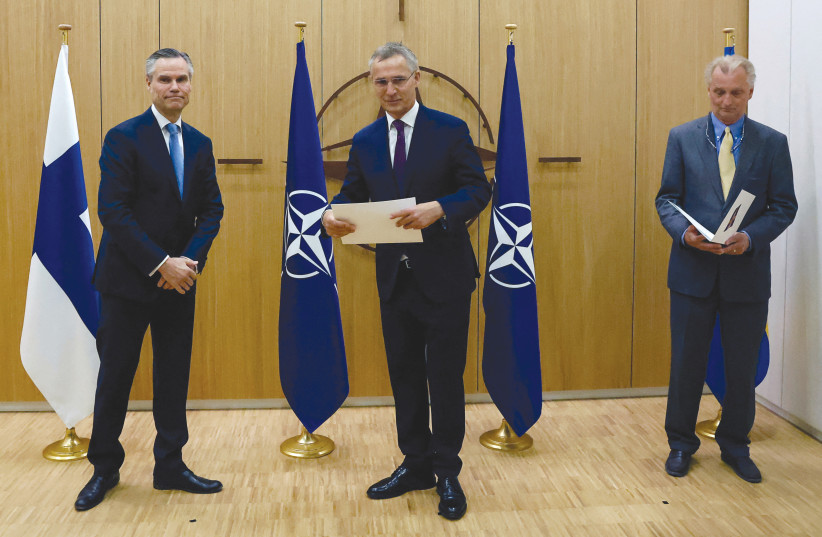Sweden said talks with Turkey over Stockholm’s application to join the NATO alliance were going well on Wednesday, days after stating the two countries were at an impasse.
For more stories from The Media Line go to themedialine.org
Swedish Prime Minister Ulf Kristersson said there had been a “misunderstanding” after he said on Sunday that Turkey was demanding things that his country could not or did not want to do.
Sweden and Finland applied for NATO membership after Russia’s full-scale invasion of Ukraine led to concerns of Moscow’s expansionist desires in Europe.
Turkey is stalling
However, Ankara has stalled their applications over several concerns, including allegations that they are harboring people it deems are connected to terrorism.
Kristersson said on Wednesday that negotiations are “going very well,” the Financial Times reported.

Also on Wednesday, Turkish President Recep Tayyip Erdogan criticized countries “under the roof of NATO” that he claimed were allowing criminals to stay in their countries in order to escape “Turkish justice.”
"Bloody murderers, who mean to the right to life, which is the most basic human right, are protected under the pretext of political asylum seekers, and can lead their lives freely without being subjected to any legal investigation,” Erdogan said at a conference in Ankara, the state news agency reported.
Turkey has claimed that the countries are home to members of the Kurdistan Workers’ Party (PKK), which is considered a terrorist organization by Ankara, the European Union and the United States.
Ankara also has demanded that Sweden extradite Bulent Kenes, the former editor of Zaman, a newspaper that was shut down over its suspected links to Fethullah Gulen, a cleric living in self-exile in Pennsylvania who is blamed for masterminding a 2016 coup attempt.
Will Turkey soften its stance?
Imdat Oner, a former Turkish diplomat, told The Media Line that Erdogan is motivated by a desire to show that he is acting against threats to the country ahead of upcoming elections.
“In the eyes of at least his own base or nationalist voters, they believe that Erdogan is protecting Turkey’s national security concerns,” Oner said.
“He’s just trying to play the tough guy image, he’s getting a benefit from that,” he added.
Oner believes that Erdogan will soften his stance after the elections.
Presidential and parliamentary votes are due to be held in Turkey by June and polls have suggested that Erdogan and his party will face tough challenges in both.
Several opposition politicians are either ahead or very close to Erdogan in the polls amid a strained economy that has seen massive inflation.
Some of Erdogan’s own supporters do not believe the government is providing accurate information on how high inflation really is, according to a Metropoll survey conducted in December.
However, the Turkish president’s numbers have steadily improved as he has increased financial support to many, at the same time as taking a tough stance on Sweden and Finland.
Kristersson said on Sunday that Swedish courts handle extradition requests.
“Erdogan and Turkey [are] asking for something that they cannot do with respect to the rule of law,” Oner said. “It will violate their own domestic procedures.”
During a press conference with the Turkish foreign minister in Ankara, Sweden’s foreign minister said at the end of December that his country increased cooperation with Turkey about people it wants extradited.
However, Turkish Foreign Minister Mevlut Cavusoglu complained that Sweden has not extradited people that Ankara believes are connected to terrorism.
Sweden, Finland and Turkey signed an agreement in June that was meant to address Ankara’s concerns.
As the deal was being struck, NATO Secretary General Jens Stoltenberg said the agreement paved the way for the applicants’ membership to the military alliance.
However, Turkey’s hand against the NATO applicants may be weakening as Russia’s efforts in Ukraine continue to reveal a military that is less strong than once feared.
“Now seeing that Russia has a humiliating situation in Ukraine even and cannot manage to achieve its military goals in Ukraine, I think that the Swedish perception has decreased. So, their willingness to accommodate Turkish demands have decreased as well,” said Omar Özkizilcik, a foreign policy and security analyst based in Ankara.
Özkizilcik does not believe that there will be an impact on relations with the US soon but believes Washington could get involved if it drags on into next year.
He disagrees that Erdogan is being guided by campaign concerns but believes Sweden may suspect it will have an easier time if a new party heads the government after the elections.
“It’s possible that the Swedish government may think that after the elections, with a new government, the negotiation position of Turkey may change. And they may be betting on this,” he said.
